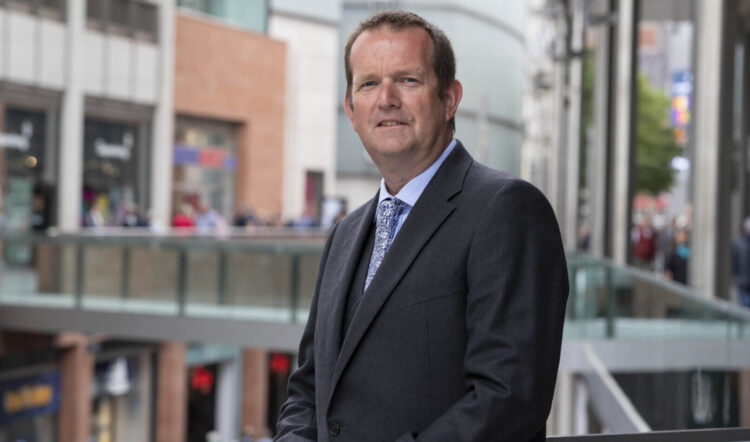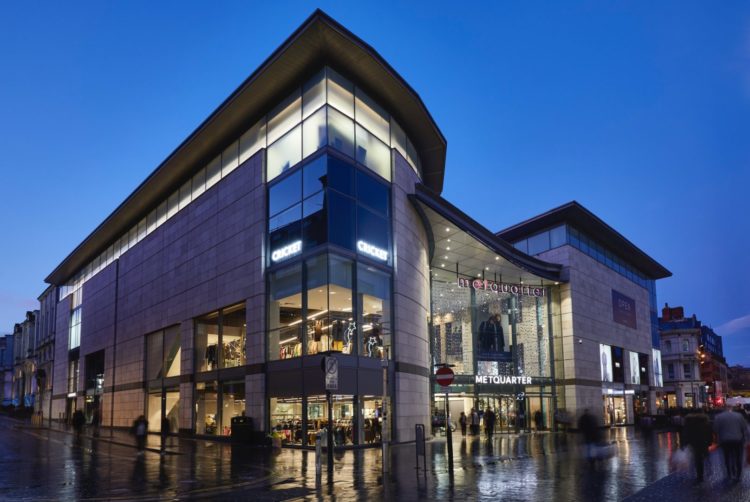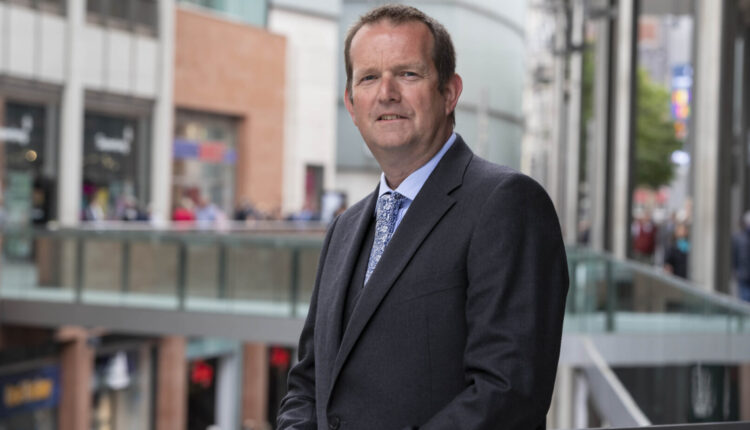In an interview with LBN, former Liverpool ONE estates director and now co-founder of the The Momentum Group, Chris Bliss, says city centres can thrive post-COVID-19 but smaller towns will struggle. Tony McDonough reports

City centres with a clear strategic plan and vision have a better chance of prospering than smaller town centres when the worst of COVID-19 is past, according to a key player in Liverpool’s 21st century resurgence.
Chris Bliss, who for a decade was estates director at the £1bn Liverpool ONE retail and leisure scheme, says the “polarisation” between city centre and smaller towns that was happening before the pandemic is likely to accelerate in the future.
And Mr Bliss, co-founder and director of Liverpool-based consultancy The Momentum Group, also predicts the most successful retailers will be those who are able combine their online and in-store outlets and offer a seamless experience to the customer.
He left Liverpool ONE three years ago after playing a major role in the phenomenal success of the scheme, which has become one of the most popular destination retail and leisure attractions in the north of England.
However, he is still involved with the Grosvenor-owned Liverpool One. It is a key client of his own business, The Momentum Group, along with upmarket Liverpool shopping mall, Metquarter. Momentum provides advisory, construction, property management, facilities management and maintenance services to its clients. Mr Bliss said: “There are not many businesses providing the range of services we offer.”
COVID effect
COVID-19 has had a devastating impact on the retail and leisure sector. The UK is now in its third national lockdown which has seen non-essential shops, bars and restaurants having to close their doors. Even in between those periods social distancing restrictions has had a significant impact on footfall.
“Predicting what will happen when we start to return to some kind of normality is almost a crystal ball moment – it is difficult to make exact predictions,” said Mr Bliss. “I think we have to break it down into bite-sized chunks.
“Pre-COVID there was already a big polarisation between cities and smaller town centres. In some cases the town centres were on their knees. People also preferred to shop at out-of-town retail parks than in town centres. I think that polarisation will continue post-COVID.
“The schemes that will look to remain dominant are the ones that have been planning their strategy and gearing up to do deals. The difference between the big city schemes and the town centres is that single ownership that offers a single asset management plan. In most town centres that isn’t the case.”
Reacting to change
There have been a number of high profile high street collapses during the pandemic. The once-dominant Arcadia Group, which includes TopShop, is wobbling and the long-troubled Debenhams group is finally set to disappear from the high street. Online fashion retailer boohoo has acquired the brand in a £55m deal and it won’t be keeping the stores open.
Mr Bliss acknowledges that many locations, including Liverpool ONE, now find themselves with a large Debenhams-shaped hole in their estates. In many cases, the retailer was an anchor tenant.
While he is unable to discuss Liverpool ONE in particular, he points out that the smarter and more forward-thinking landlords will have been anticipating Debenhams’ demise for a number of years and will have a plan in place to utilise the space that is left behind.
“Those places with good asset managers will have seen this coming for a long time,” he added. “Debenhams has long been high on the list of outlets that were struggling. Department stores are very difficult machines to make viable. Asset managers will have already started talking to other potential occupiers and will be ready to makes changes to the configuration of the space.”

Prior to the pandemic, online retailers accounted for around 18% of UK non-food retail sales. Since March 2020 that percentage has rocketed to more than 30% but Mr Bliss is optimistic that while it may not come back down to 18% it will probably fall to a lower level when shops fully reopen.
He explained: “In the days before e-commerce, catalogue retailers such as Littlewoods and Argos accounted for around 15% of non-food retail sales. So, prior to the pandemic, online retail has only pushed that up by another three percentage points.
“Fulfilment from online retailers isn’t great. I ordered a product online recently. I was promised delivery within a few days but it ended up taking a couple of weeks with several calls to the delivery company. If John Lewis had been open I probably would have gone there instead.
“I think it is possible that many people are now fed up shopping online and want to get back to the ‘sticks and bricks’ retailers and actually get their hands on the products. I think you could quickly see that percentage of online sales drop to around 25%.”
Seamless experience
Mr Bliss believes the most successful retailers going forward will be those who offer customers a seamless, multi-channel experience between the online and the bricks and mortar experience.
“There has been recent research which suggests retailers who can maximise both online and physical sales will see uplifts of up to 30%. It is called ‘the halo effect’ and companies such as Apple and Nike already do it well.
“They want customers to come into their shops and have a great experience and ultimate, they don’t care whether the customer chooses to buy the product through and online channel or in the store. The most successful retail outlets will become more like car showrooms with a lot more personalisation.”
Metquarter, just yards away from Liverpool ONE is has undergone something of a renaissance and reinvention under its current owner Queensberry. It opened before Liverpool ONE and was home to a number of high-end retailers.
It was originally hoped that it would retain these top-end brands and Liverpool ONE would would cater for the mid-market. However, such was the gravitational pull of the huge footfall of Liverpool ONE following its opening in 2008, Metquarter endured a difficult period.
However, it has retained a solid retail offer it has also secured a number of other lettings that have diversified its offer. In particular the Everyman cinema and, this year so far, the General Post Office food hall and the £15m LMA performing arts academy have cemented the turnaround strategy.
Mr Bliss added: “Metquarter is a classic example of having a clear asset management plan and being brave enough to explore alternative uses. I think we will see more steady change there as time goes on.”

